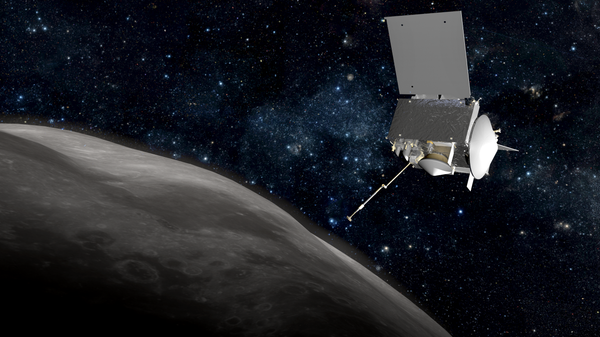The Outer Space Treaty (OST) turns 50 this month. The foundational 1967 pact establishes space as “the province of all mankind” and forbids the nearly 100 states that have ratified or acceded to it from colonizing celestial bodies or using them for military operations. The agreement is taking on renewed relevance with the looming prospect of asteroid mining—a possibility that was barely imaginable when the treaty was forged but is now a near reality.
Two companies, California-based Deep Space Industries and Washington State–based Planetary Resources, are actively working toward extracting resources from asteroids. They aim to supply deep-space necessities such as water, rocket fuel and building materials, which are prohibitively expensive to transport from Earth. Both firms say they plan to launch prospecting spacecraft to asteroids by late 2020, with missions to test the technology in low Earth orbit slated for as early as this year. Their ambitious timeline has full-scale mining operations planned for the latter half of the 2020s.
The easiest resource to target is water, says Deep Space Industries chief scientist John Lewis. The life-supporting liquid can be electrically converted into hydrogen and oxygen for fuel. Water makes up as much as 10 percent of the mass of some asteroids, locked up in minerals similar to the glittery mica found in many Earth rocks—but it can be baked out in a solar oven, along with other volatiles such as nitrogen or sulfur compounds. Modified terrestrial mining techniques could make it possible to harvest iron from asteroids as well.
On supporting science journalism
If you're enjoying this article, consider supporting our award-winning journalism by subscribing. By purchasing a subscription you are helping to ensure the future of impactful stories about the discoveries and ideas shaping our world today.
To extract anything, though, companies will first need to gather raw materials from an asteroid—a process that some countries, including Russia, Brazil and Belgium, say runs afoul of the treaty. The OST makes no explicit mention of mining, but one of its key provisions is a ban on “national appropriation” of celestial bodies. That arguably applies to resource extraction, but the pact “doesn't provide you with much guidance” on that front, says Frans von der Dunk, a space law professor at the University of Nebraska–Lincoln.

The United Launch Alliance Atlas V rocket, carrying NASA's OSIRIS-REx spacecraft, lifts off from Cape Canaveral, Fla., in 2016. Credit: Courtesy of NASA and Joel Kowsky
Proponents of asteroid mining, von der Dunk says, view the ban similarly to the “global commons” status of the high seas: no state may colonize the Atlantic Ocean, yet anyone can harvest its fish. Planetary Resources chief counsel Brian Israel and others similarly argue that using materials harvested from an asteroid would not constitute appropriation.
Several governments have embraced this permissive interpretation. The U.S. Department of State has held for decades that the OST permits commercial exploitation. The federal government doubled down in 2015, when President Barack Obama signed a law recognizing American citizens' property rights to asteroid-derived resources and authorizing a licensing program for mining. Luxembourg, which is angling to become a world hub for space mining, recently passed a similar law. By establishing national licensing regimes, Brian Israel argues, such laws fulfill the OST's requirement that states ensure the compliance of their citizens.
Not everyone is so sanguine, however. For other global commons, such as Antarctica, the guidelines for permissible extraction were spelled out in far more detailed treaties, notes Joanne Gabrynowicz, editor in chief emerita of the Journal of Space Law. Without such clarification, opponents of unilateral space mining claim that “because outer space belongs to everyone, the resources belong to everyone,” von der Dunk says. Therefore, countries must agree on an “international licensing body and some international sharing of benefits” before private entities can mine. This argument resonates especially with developing countries, which see echoes of rich colonialists' history of invading foreign territories and exploiting their resources, Gabrynowicz adds.
But the prospects for a new international framework appear grim. The Moon Agreement, an earlier attempt at spelling out the rules for resource use, remains unratified by any major spacefaring country specifically because of concerns about mandatory benefit sharing, and the global appetite for new treaties seems meager. Von der Dunk hopes that “the rest of the world more or less aligns with the U.S. approach” over the next few years. But Stanford University research engineer Nicolas Lee predicts that nothing will happen until “a company actually goes out there and does something.”
That day may be closer than it seems. Lindy Elkins-Tanton, principal investigator for NASA's upcoming scientific mission to the metal asteroid Psyche, says previous missions have demonstrated all the technology needed to nestle against—if not land on—an asteroid. And NASA's OSIRIS-REx spacecraft is already en route to the water-rich asteroid Bennu, aiming to return a sample of the space rock for scientific study. OSIRIS-REx principal investigator Dante Lauretta, who also consults for Planetary Resources, believes almost all of the mission's technology will translate to commercial enterprise. Meanwhile the costs of space missions are plummeting thanks to the burgeoning private space industry.
There will still be a lag between the first missions and full-scale mining; Lauretta compares the current phase to “kicking over rocks to see where the gold nuggets are” and acknowledges that the technology for processing materials in space is not yet ready. But Lee is certain someone will pull off a mining operation sooner or later. When that happens, companies and regulators will have to find a healthy balance among many interests. “Exploration has not always been a positive thing in the past,” Elkins-Tanton says. “We've got this opportunity right now to do better.”
